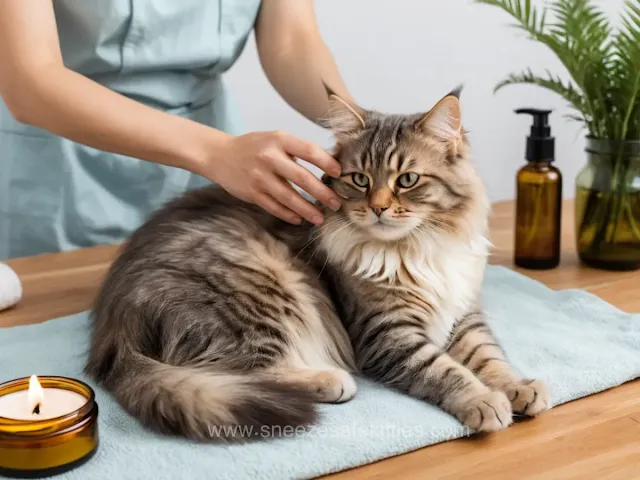Using Natural Remedies for Hypoallergenic Cat Health Care
 |
| Natural Remedies for Hypoallergenic Cat |
In this article, we will delve into the world of
natural remedies that can help support your
hypoallergenic cat's overall health. From skin
care to stress management, there are many holistic, plant-based, and non-toxic options that can keep your feline friend happy and healthy. While these remedies are gentle, it's important to consult your veterinarian before introducing anything new to your cat’s routine, especially if they have specific
health issues.
Coconut Oil for Skin and Coat Health
Hypoallergenic cats may sometimes experience sensitive or dry skin due to environmental factors or diet. One of the most popular
natural remedies for improving the condition of a cat’s coat and skin is coconut oil. Known for its moisturizing properties, coconut oil helps soothe irritation, improve skin elasticity, and make your cat’s coat silky and smooth. Additionally, its antifungal and antibacterial properties can assist in preventing or treating minor infections or wounds.
- How to Use: Rub a small amount of organic, cold-pressed coconut oil between your palms and gently massage it into your cat’s fur, focusing on dry or itchy areas. Be mindful of how much you use, as applying too much can make their coat greasy. Coconut oil is also safe for cats to ingest in small quantities, so you don't have to worry if they lick it off.
Chamomile for Stress and Anxiety Relief
Stress can be a common issue for
hypoallergenic cats, especially if they are sensitive to changes in their environment. Moving to a new home, new people, or even routine vet visits can cause anxiety in cats. Chamomile, a gentle herb widely known for its calming properties, can be a helpful remedy for reducing feline stress.
- How to Use: Chamomile can be administered in different ways, but one of the safest methods for cats is through a chamomile tea mist. Brew a cup of chamomile tea and let it cool completely. Pour it into a spray bottle and lightly mist your cat’s bedding or favorite lounging areas. Alternatively, you can use chamomile essential oil in a diffuser (well-diluted and in small amounts) to create a soothing atmosphere in your home. Always ensure that essential oils are used safely around pets and never apply them directly to your cat’s fur or skin.
Apple Cider Vinegar for Ear Infections and Cleaning
Hypoallergenic cats, just like all other cats, are prone to ear infections or ear mites, especially if they have an outdoor lifestyle. Apple cider vinegar (ACV) is a natural solution that can help keep their ears clean and
healthy. Its antibacterial and antifungal properties make it an effective treatment for minor infections and ear cleaning, preventing a buildup of dirt, wax, or yeast.
- How to Use: Mix equal parts of apple cider vinegar and water. Using a cotton ball, gently clean the outer parts of your cat’s ears. Be careful not to pour any solution into the ear canal, as this can cause irritation or worsen infections. Regular ear cleaning with diluted ACV can help keep infections at bay.
Pumpkin for Digestive Health
Maintaining proper digestive
health is essential for any cat, hypoallergenic or not. However, some cats are more prone to gastrointestinal issues like constipation or diarrhea due to diet, stress, or food sensitivities. One simple natural remedy to aid digestion is plain canned pumpkin. Pumpkin is rich in fiber, which helps regulate bowel movements and supports gut health.
- How to Use: Add a small spoonful of pure pumpkin (not pumpkin pie filling, which contains spices) to your cat’s regular food. Start with a small amount to ensure your cat tolerates it well. If your cat enjoys it, pumpkin can be added to their diet a couple of times per week as a natural fiber supplement.
Aloe Vera for Wounds, Burns, and Skin Irritations
Aloe vera is a well-known natural remedy for soothing skin irritation, promoting healing, and reducing inflammation. If your
hypoallergenic cat has minor cuts, burns, or insect bites, aloe vera gel can help speed up the healing process and alleviate discomfort. However, it’s important to note that while aloe vera is beneficial for external use, it is toxic to cats if ingested in large amounts, so
care should be taken to prevent them from licking it off.
- How to Use: Apply a small amount of pure, additive-free aloe vera gel to the affected area on your cat’s skin. Keep an eye on them to ensure they don’t lick it off. Alternatively, you can use an aloe-based ointment recommended by your vet for extra safety.
Natural Flea Prevention: Diatomaceous Earth
Hypoallergenic cats, especially those that spend time outdoors, can be exposed to fleas, which not only cause discomfort but can lead to skin irritations. One natural way to prevent flea infestations is by using diatomaceous earth (DE), a fine powder made from fossilized algae. Food-grade diatomaceous earth is safe for cats and effective in eliminating fleas without the need for chemical treatments.
- How to Use: Lightly dust your cat’s bedding, carpets, and areas where they frequently rest with food-grade DE. You can also apply a small amount to your cat’s coat, but avoid the face and eyes. Leave the powder on for a few hours before vacuuming it up. DE works by dehydrating the fleas and their larvae, disrupting their life cycle.
Conclusion
Natural remedies can be a safe and effective way to care for your
hypoallergenic cat’s health. From skin
care to digestion, stress relief, and flea prevention, there are a variety of plant-based and holistic approaches to maintaining your cat’s wellness. As always, it’s important to consult with your veterinarian before starting any new treatment to ensure it aligns with your cat’s specific needs.

